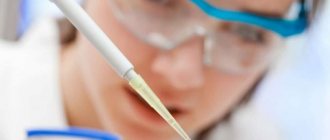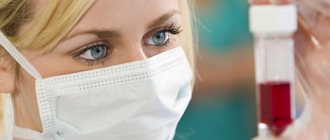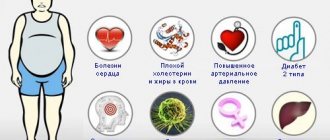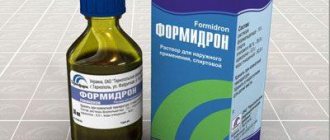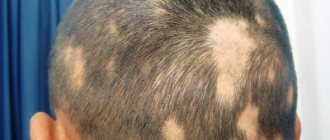Human immunoglobulin normal (Immunoglobulinum humanum normale)
Immunoglobulin is injected intramuscularly into the upper outer quadrant of the gluteal muscle or the outer surface of the thigh. The drug should not be administered intravenously.
Before injection, ampoules with the drug are kept for 2 hours at room temperature 20±2 °C. To avoid foam formation, the drug is drawn into a syringe with a wide bore needle. The drug cannot be stored in an opened ampoule. Preparations in ampoules with damaged integrity or labeling are not suitable for use, if there is a change in physical properties (change in color, clouding of the solution, the presence of unbreakable flakes), if the expiration date has expired, or if stored improperly.
The dosage of the drug and the frequency of its administration depend on the indications for use.
Prevention of hepatitis A
The drug is administered once in the following quantities: children from 1 to 6 years old - 0.75 ml (1/2 dose); from 7 to 10 years - 1.5 ml (1 dose); over 10 years old and adults - 3 ml (2 doses). Repeated administration of immunoglobulin according to indications - no earlier than after 2 months.
Preventing measles
The drug is administered once, from 3 months of age, to those who have not had measles and have not been vaccinated, no later than 4 days after contact with the patient. The dosage of the drug for children (1.5 or 3.0 ml) is established depending on the state of health and the time that has passed since contact with the patient. For adults, as well as children in contact with mixed infections, the drug is administered in a volume of 3.0 ml (2 doses).
Prevention and treatment of influenza
The drug is administered once in quantities: children under 2 years old - 1.5 ml (1 dose); from 2 to 7 years - 3.0 ml (2 doses); over 7 years old and adults - 4.5-6.0 ml (3-4 doses). When treating severe forms of influenza, repeated (after 24-48 hours) administration of immunoglobulin in the same dosage is indicated.
Prevention of whooping cough
The drug is administered twice with an interval of 24 hours in a single dosage of 3.0 ml (2 doses) to children who have not had whooping cough, as early as possible after contact with the patient.
Prevention of meningococcal infection
The drug is administered once to children aged 6 months to 7 years, no later than 7 days after contact with a patient with a generalized form of meningococcal infection in a dosage of 1.5 ml (1 dose) for children under 3 years and 3.0 ml (2 doses) - children over 3 years old.
Prevention of polio
The drug is administered once in an amount of 3.0-6.0 ml (2-4 doses) to unvaccinated or incompletely vaccinated children with polio vaccine as early as possible after contact with a patient with the paralytic form of polio.
Treatment of hypo- and agammaglobulinemia
The drug is administered in an amount of 1.0 ml per kg of body weight; the calculated dose can be administered in 2-3 doses with an interval of 24 hours. Subsequent administrations of immunoglobulin are carried out according to indications no earlier than after one month.
Increasing the body's resistance during the period of convalescence of acute infectious diseases with a protracted course and in chronic and protracted pneumonia
The drug is administered in a dosage of 0.15-0.2 ml per 1 kg of body weight. The frequency of administration (up to 4 injections) is determined by the doctor; the interval between injections is 2-3 days.
Indications for the study
Indications for a blood test for immunoglobulin E are diseases and conditions associated with this substance. These include:
- dermatographism - a specific skin reaction in the form of urticaria or redness in places that came into contact with hard, blunt objects (literally drawings on the skin), disappearing spontaneously 30-40 minutes after occurrence;
- repeatedly exacerbating dermatitis, widespread throughout the body;
- increased skin sensitivity to household chemicals, cosmetics, food products;
- increased sensitivity to food, expressed by intestinal symptoms or dermatitis;
- long-term exacerbation of sinusitis, rhinitis, bronchitis and attacks of bronchial asthma of unknown origin.
Indications for the study also include:
- an allergic reaction, the source of which cannot be determined from anamnesis, including by keeping a daily diary of an allergy sufferer;
- unclear or questionable results of skin tests that did not give a clear picture of the degree of sensitization to a specific allergen, or giving reason to assume a false negative result;
- impossibility of performing skin tests - history of increased sensitivity to reagents, high risk of anaphylactic shock, taking antihistamines with the impossibility of stopping them even for a short time;
- patient's reluctance to do skin tests.
Also, an analysis for immunoglobulin E is carried out to clarify the diagnosis, when it is necessary to establish the specificity of the allergen and the degree of sensitivity of the body to it. This data is necessary to create an effective treatment plan.
Good to know: The examination is not carried out when skin tests are sufficient to make an accurate diagnosis.
Immunoglobulin therapy is a natural defense mechanism
Nowadays, immunoglobulins are used to combat various infectious diseases - tick-borne encephalitis, cytomegalovirus, staphylococcus, and also as a therapy for patients with allergies and primary immunodeficiency. In the latter case, treatment using normal human immunoglobulin is indicated. For these types of immunodeficiencies, when the patient’s body is not able to produce antibodies on its own, the normal human immunoglobulin preparation makes up for the lack of antibodies that usually circulate in the blood of a healthy person, providing patients with a high quality of life.
In case of treatment of allergies, an antiallergic immunoglobulin drug is used. Immunoglobulins also help fight autoimmune diseases such as systemic lupus erythematosus, Guillain-Barré syndrome or Kawasaki syndrome.
Immunoglobulin therapy, due to its natural nature, is often prescribed to pregnant women when many antibiotics are contraindicated due to the negative effect on the fetus. At the same time, anti-Rhesus immunoglobulin is the only way to avoid hemolytic disease of the fetus in case of Rh conflict during pregnancy.
Today, the pharmaceutical industry can offer preparations of specific immunoglobulins for various types of microorganisms. But even if the required drug is not available, it can be created quite quickly. This is one of the key advantages of immunoglobulins - the ability to urgently obtain specific antibodies. Thus, immunoglobulin therapy is indispensable when new strains of infection, for example, the influenza virus, appear in epidemics, especially in the absence of a vaccine. It is not surprising that immunoglobulin therapy has become especially relevant during the COVID-19 pandemic.
Double immune response to Covid
In our country, one of the largest manufacturers of antibody-based drugs is Nacimbio. The pharmaceutical holding company, NPO Microgen, produces Normal Human Immunoglobulin, Albumin and other drugs based on blood plasma, including specific immunoglobulins, the line of which was recently supplemented by COVID-Globulin. Thus, Russia has the opportunity to use two types of immunization against coronavirus at once - immunoglobulin and vaccine.
Photo: Nacimbio
Nacimbio developed the drug in active collaboration with the Moscow Department of Health. Moscow doctors and experts were involved in this work, Moscow also provided centers for conducting clinical trials of the drug. Well, and the most important thing is the transfer of raw materials for the production of immunoglobulin. “COVID-globulin” is created based on the blood plasma of people who have antibodies to the SARS-CoV-2 virus. For this purpose, the capital’s Department of Health supplied Nacimbio with 2.5 tons of donor plasma. A special feature of immunoglobulin is the use of a chromatographic purification system, which ensures viral safety and the complete absence of foreign elements and proteins.
After successfully completed preclinical trials and the first phase of clinical trials, the Ministry of Health of the Russian Federation registered “COVID-globulin”. At the beginning of April, the second and third phases of clinical trials began, which will last approximately six months.
Plans for this year include processing at least 15 tons of plasma, which will help 10-15 thousand patients. Anyone who has suffered from COVID-19 can become involved in this great cause. Read more about how to become a plasma donor here
Drug interactions Human immunoglobulin
Concomitant use of immune globulin may reduce the effectiveness of active immunization against measles, rubella, mumps and varicella. In this regard, live viral vaccines for parenteral use should not be used for 6 weeks to 3 months after the use of immunoglobulin. In case of repeated administration in doses from 400 mg to 1 g/kg in children with idiopathic thrombocytopenic purpura or other pathology, vaccination against epidemic hepatitis should be postponed for 8 months. Immunoglobulin should not be mixed in the same volume with any other medications.
Why is an elevated level of immunoglobulin dangerous?
Immunoglobulin IgE is a structural part of the body's natural immune defense. Its initial role is to neutralize pathogenic organisms (bacteria, viruses and helminths) on mucosal surfaces. They attract immunoglobulins G, eosinophils, neutrophils and other biologically active substances to the area where pathogens invade, getting rid of the threat. Therefore, it would be incorrect to talk about the harm of IgE during the normal functioning of the immune system.
A completely different picture unfolds with an atypical increase in IgE in response to their reaction with allergens. In this case, the immunoglobulin “raises troops” against a non-existent enemy, and the cells called upon to protect the body attack its own tissues. However, even with its increase, we cannot say that it is IgE that threatens human health. First of all, it is a marker indicating existing disorders that can be corrected under the guidance of a competent doctor.
Contraindications
The use of immunoglobulin is contraindicated if there has been a history of an allergic reaction to injected blood products. For people prone to allergies (atopic dermatitis, bronchial asthma, urticaria, etc.), the drug is administered with the support of antihistamines. After completing the immunoglobulin course, it is recommended to continue using antihistamines for another week. Immunoglobulin should not be taken if you have IgA deficiency.
The drug is prescribed with great caution to people with diabetes, since the infusion solution may contain components that affect blood sugar levels. In patients with heart failure, kidney pathology, and pregnant women, immunoglobulins are used with regular monitoring by the attending physician.
Immunoglobulins are not combined with vaccination, since the effectiveness of immunization is reduced. It is recommended to vaccinate at least 30 days after completing the course of immunoglobulin.
The use of immunoglobulin should be carried out strictly as prescribed by a doctor. You should not take the drug on your own, as this may have negative health consequences. At the Yusupov Hospital, you can get advice on the need to use immunoglobulin from qualified specialists. The hospital operates clinics for therapy, neurology, oncology, rehabilitation, surgery and intensive care, where the patient will be provided with all the necessary information depending on the profile and condition. The Yusupov Hospital is equipped with a modern diagnostic center, where the patient can go for examination and obtain the most accurate data on his state of health. Based on diagnostic data, a specialized specialist selects an adequate treatment that will be most effective in this particular case.
You can make an appointment with a specialist and get information about the work of the diagnostic center by calling the Yusupov Hospital.
Side effects of the drug Human immunoglobulin
more likely during the first infusion; occur soon after the start of the infusion or during the first 30–60 minutes. From the side of the central nervous system: possible headache, nausea; less often - dizziness. From the digestive tract: in rare cases - vomiting, abdominal pain, diarrhea. From the cardiovascular system: rarely - arterial hypotension or hypertension (arterial hypertension), tachycardia, feeling of constriction or chest pain, cyanosis, shortness of breath. Allergic reactions: very rarely, severe arterial hypotension, collapse and loss of consciousness have been observed. Other: possible hyperthermia, chills, increased sweating and fatigue, malaise; rarely - back pain, myalgia; numbness, hot flashes, or cold sensation.
